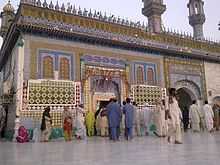Sultan Bahu
| Sultan Bahu سلطان باہو | |
|---|---|
 Shrine of Sultan Bahu | |
| Born | ?1628 |
| Died | ?1691 |
| Ethnicity | Awan (Pakistan) |
| Known for | Sufism, Poetry, Sarwari Qadiri Sufi order |
| Title | Bahu(with God) and Faani fi'llahi (Annihilated in God) |
| Religion | Islam |
Sultan Bahu (or Bahoo, Punjabi: سلطان باہو, literally "with Him"[1]:4, or Bahu A'wan; ca 1628–1691) was a Muslim scholar who founded the Sarwari Qadiri Sufi order and was considered by his followers to be a saint.
Little is known of Bahu's life, other than a hagiography written by a descendant of his seven generations later, entitled Manaqib-i Sultani.[1]:12 As best as can be told, Sultan Bahu was born in Anga, Soon Valley, Sakesar in the Punjab Province of modern Pakistan. More than forty books on Sufism are attributed to him, mostly in Persian, and largely dealing with specialized aspects of Islam and Islamic mysticism.[citation needed] However, it ishis Punjabi poetry which had popular appeal and earned him lasting fame.[1]:14 His verses are sung in many genres of Sufi music including qawwali and kafi. Tradition has established a unique style of singing his couplets. The Punjab region became predominantly Muslim due to missionary Sufi saints whose dargahs dot the landscape of Punjab region.
Spiritual genealogy (tareeqa)

Sultan Bahu claimed direct descendant from Ali, the cousin of Muhammad, through his descent from the Awan tribe[1]:12 which traces its descent from Ameer Shah, son of Qutb Shah.
Sultan Bahu belonged to the Qadiri Sufi order, and later initiated his own offshoot, Sarwari Qadiri. He refers to Muhiyuddin Abdul Qadir Gilani as his spiritual master in a number of his books and poetry, though Abdul Qadir Gilani died long before the birth of Sultan Bahu. However, some Sufis maintain that Abdul Qadir Gilani has a special role in the mystic world and that all orders and saints are always indebted to him directly or indirectly in some way.
Sultan Bahu's education began with his mother, Mai Rasti, herself a saintly woman who has her own mausoleum in Shorkot. She told him to seek spiritual guidance from Hazrat Shah Habib Gillani whose shrine is in village called Baghdad Sharif which is is situated near Abdul Hakim (tehsil Mian Channu district Khanewala Punjab Pakistan) . After some time he moved to Delhi for further 'polishing' under the guidance of Sheikh Abdul Rehman al Qadari. Soon Sheikh Abdul Rehman al Qadari felt that he can not add anything to Sultan Bahu's knowledge as Sultan Bahu already knew more than Sheikh Abdul Rehman al Qadari. This did not take long, after which Sultan Bahu returned to his own, familiar surroundings.
Silsila
The complete spiritual lineage (silsila) of Sultan Bahu is as follows:
- Ali ibn Abi Talib
- Hassan Basri
- Shah Habib Al Ajami
- Daud Tai
- Maruf Karkhi
- Sari As Saqäti
- Shaykh Junayd Baghdadi
- Abu Bakr Shibli
- Walid Abdul Wahid
- Abul Farrah Yusuf
- Sheikh bu Hassan
- Sheikh bu Saeed Al Mubarak
- Sheikh Abdul Qadir Jilani
- Abdur Razzaq
- Abdul Jabbar
- Yahya Wali
- Sheikh Najmuddin
- Abdul Sattar
- Abdul Baqa
- Syed Abdul Jalil (Sath Shahani)
- Abdûr-Rahman (Dhhli)
- Sultan Bahu
Literary works
The actual number of books written by Sultan Bahu is not certain. According to tradition, he is supposed to have authored over one hundred and forty works and treatises. The following is a list of the important works of Sultan Bahu that still exist today, and can be traced back to him with credibility.
- Abiyaat-e-Bahoo
- Risala-e-Ruhi
- Nurul Huda (Kalaan)
- Nurul Huda (Khurd)
- Aql Baidaar
- Mahq-ul-Fuqar (Kalaan)
- Mahq-ul-Fuqar (Khurd)
- Aurang-Shaahi
- Jami-il-Asraar
- Taufiq-Hedaayat
- Kaleed Tauheed (Kalaan)
- Kaleed Tauheed (Khurd)
- Ainul Faqr
- Shamsul Arifeen
- Magzane Faiz
- Asrare Qaderi
- Kaleed Jannat
- Muhqamul Fuqar (Kalaan)
- Muhqamul Fuqar (Khurd)
- Majaalis-tun Nabi
- Muftahul Arifeen
- Hujjatul Asraar
- Jannatul Firdaus
- Kash-ful Asraar
- Muhabbatul Asraar
- Panj Ganj
- Fazlul Laqa
See also
- Sufism
- List of famous Sufis
- Sarwari Qadiri
Commemoration
The mausoleum of Sultan Bahu located in Garh Maharaja,[2] Punjab, was originally built on his grave but has had to be moved twice when the Chenab River changed its course. It is a popular Sufi shrine, and the annual urs festival commemorating his death is celebrated with great fervour. The urs festival is held during the month of Muharram. Every year on the 9th of Muharram, a ghusal (bath) is also conducted under the supervision of Sahibzada Sultan Fiaz ul Hassan, Sajjada Nasheen (chair-holder) of the Sultan Bahu shrine, in which the descendants of Sultan Bahu wash his shrine with rose water.
Further reading
- Ravindra Mohan Chopra (1999). Great Sufi Poets of the Punjab. Iran Society.
References
- ↑ 1.0 1.1 1.2 1.3 Sult̤ān Bāhū (1998). Death Before Dying: The Sufi Poems of Sultan Bahu. University of California Press. ISBN 978-0-520-92046-0.
- ↑ Sadia Dehlvi. Sufism: Heart of Islam. HarperCollins Publishers. pp. 185–. ISBN 978-93-5029-448-2.
External links
- Kalam e Sultan Bahu at Academy of the Punjab in North America